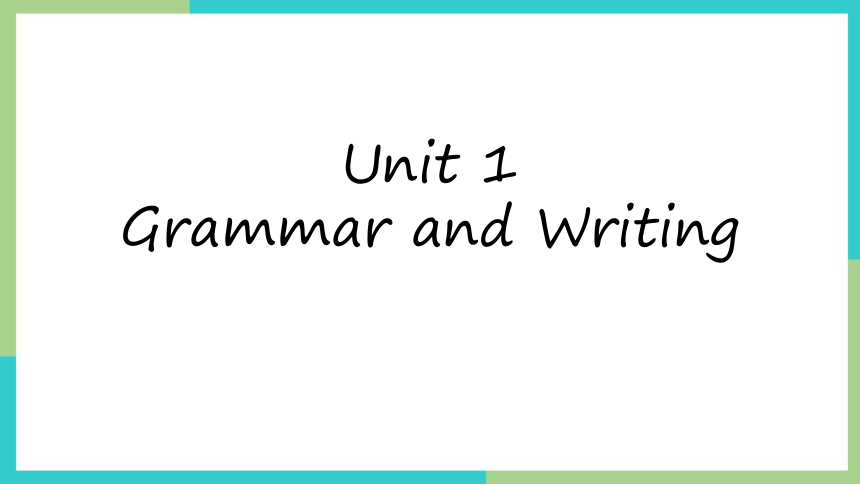(
课件网) Unit 1 Grammar and Writing Unit 1 Grammar Grammar Focus What’s the matter I have a stomachache. You shouldn’t eat so much next time. What’s the matter with Ben He hurt himself. He has a sore back. He should lie down and rest. Do you have a fever Yes, I do./No, I don’t./I don’t know. Does he have a toothache Yes, he does. He should see a dentist and get an X-ray. What should she do She should take her temperature. Should I put some medicine on it Yes, you should./No, you shouldn’t. 一、反身代词及其用法 1. 反身代词 Key points 第一人称 第二人称 第三人称 单数 myself yourself himself, herself, itself 复数 ourselves yourselves themselves Grammar Focus 2. 用法 注意:①oneself不可单独作主语; ②表示“某人自己”而非“某人的东西”。 二、情态动词should的用法 情态动词本身有一定的意义,多用来表示“提议”“建议”或“请求”,但不能单独作谓语。 情态动词_____意为“应该”,用于表达职责和义务、提出劝告,而且表述的是自己的主观看法,没有数和时态的变化,其后接_____。例如: As a student, you should get to school on time. 作为一名学生,你应该按时到学校。 should的否定形式是_____,意思是“不应当;不该”,其后接_____。例如: As we all know, we shouldn’t tell lies. 总所周知,我们不应该说谎话。 should 动词原形 should not/shouldn’t 动词原形 谓语中含有should的陈述句变一般疑问句时,应该把should放在_____,并把句号变成问号。例如: We should go to sleep when it is 10:00 in the evening. (变为一般疑问句) _____ we go to sleep when it is 10:00 in the evening 含有should的陈述句变特殊疑问句时应该把should放在疑问词后面,并将句号改为问号。例如: She should have a rest when she comes here. (用why变为特殊疑问句) Why should she have a rest when she comes here 句首 Should 三、有关疾病、伤害及救治的表达法 表示患病 have/get a(n)+疾病名称(have更常见) e.g. have a cold have a fever have a cough get a stomachache get a toothache 某些搭配中还会使用catch,如catch a cold等。 表示不适 be/feel+形容词 be/feel tired be/feel sick be/feel dizzy(晕头转向) head feels hot 表示伤害 hurt/cut/break+身体具体部位 hurt my leg cut her finger break his arm hurt myself cut himself 表达诊治:take/get…(take更常见) take one’s temperature take some medicine take an injection (注射) take/get an X-ray 表达就医:see…/go to… see the dentist/doctor go to a doctor go to (the) hospital 情态动词 should 1.否定形式: should not / shouldn’t “不应当;不该” should 是情态动词, 意为“应该”, 后接动词原形, 表示责任和义务、 征询意见或建议等。 2.含有should的肯定句变一般疑问句时,应将should提到句首: She should take her temperature. Should she take her temperature 肯定回答:Yes, 主语+should. 否定回答:No, 主语+shouldn’t. --Yes, she should. --No, she shouldn’t. Ⅰ.用所给单词的适当形式填空。 1.He shouldn't _____(eat) in class. 2.Should I _____(take) my temperature 3.The old man had problems breathing. What should we do _____(help) him 4.Watching TV _____(it) isn't always bad for you,but too much of it is not good. 5.“You are old enough,boy. You'd bet ... ...

